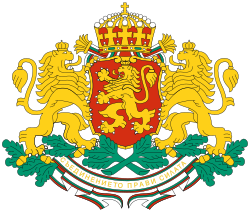This article includes a list of references, related reading, or external links, but its sources remain unclear because it lacks inline citations .(August 2018) |
Raykov Government | |
|---|---|
| 86th Cabinet of Bulgaria | |
| Date formed | February 12, 1997 |
| Date dissolved | May 21, 1997 |
| People and organisations | |
| Head of state | President Petar Stoyanov |
| Head of government | Stefan Sofiyanski |
| Status in legislature | Caretaker Government |
| History | |
| Predecessor | Videnov Government |
| Successor | Kostov Government |
 |
|---|
The eighty-sixth Cabinet of Bulgaria was a caretaker technocratic government set up by President Petar Stoyanov following the resignation of the Videnov government. The government, headed by Prime Minister Stefan Sofiyanski, ruled from February 12, 1997 to May 21, 1997, when the new cabinet took office.